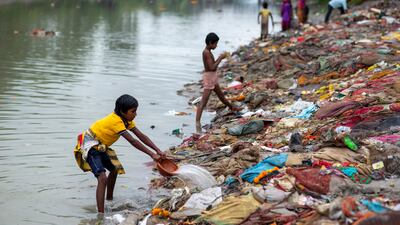To get a sense of how much Indians treasure the Ganges River, just look at the many names it takes. Ganges originates from the Hindu Goddess Ganga. There are several other titles, many of which have religious connotations. Today, cremation ashes are sprinkled in it and Hindus believe that bathing there can help wash away sin.
The Seine in France also has religious connections. It is named after the young female Celtic deity Sequana.
These are just two examples to show how humans still venerate their crucial, symbolic waterways. But they are also examples of how modern man is failing them.
Ahead of the Paris Olympics, which takes place in 2024, France has launched a €1.5 billion ($1.6 billion) effort to clean up the Seine. Years of pollution – largely as a result of sewage spilling into it – led to a ban on swimming in the river in 1923. By 2025, more than 100 years later, swimming will finally be allowed again because of the successful clean-up.
It is a less positive picture in the UK, where dangerously high water-pollution levels across the country have been controversial in recent years. They are in large part due to excessive use of fertiliser and pesticides, untreated sewage and polluted run-off water from roads and towns. High levels are estimated to put 10 per cent of freshwater and wetland species at risk of extinction.
Fortunately, people are taking note around the world. In 2017, a river in New Zealand was granted the same legal rights as a human being, after advocacy from a local Maori tribe.
A similar story took place in India, too. In March 2017, the High Court in Uttarakhand state, ruled that the Ganges and Yamuna rivers had the same legal status as human beings, although it was eventually overturned that year by the Supreme Court.
These practical and symbolic moves by people trying to protect waterways demonstrate two things. First, that humanity will always need freshwater. It is no coincidence that many of the world's great capitals were founded next to rivers. In Egypt, the Nile is as crucial today as it was for the Ancient Egyptians, in terms of health, livelihoods and environmental well-being. As the consequences of climate change become more obvious, their practical benefits will only become clearer.
The second is more profound. No matter what the culture, rivers always have some kind of deeper significance for people. One the most poignant and worrying declines in Iraq is the drying up of its ancient rivers and marshlands. As they disappear, people lose something beautiful and spiritual that their ancestors shared for thousands of years. It is little surprise that in the Iranian city of Isfahan, the dried-out river bed of the once copious Zayandeh is often cited in anti-government protest movements.
All countries have a right to industrialise, and it is inevitable that a rapidly growing population and economy will have effects on the natural environment. But it must be protected as much as possible. The good news from countries such as India, France and New Zealand is that a great deal can be done to reverse even decades of decline. In 2015, the Indian government launched Namami Gange, a plan to revive the Ganges, with a budget of 200 billion rupees, which this year has been given an extra 100 billion.
By taking the initiative to do so, governments around the world cannot just save the environment and its people, but the very soul of their countries, too.


